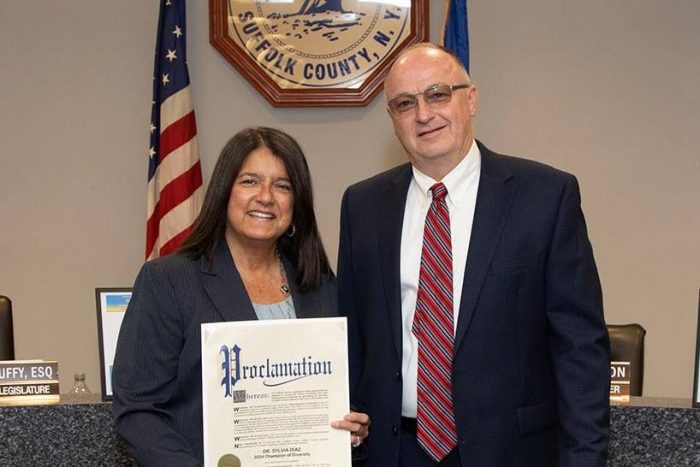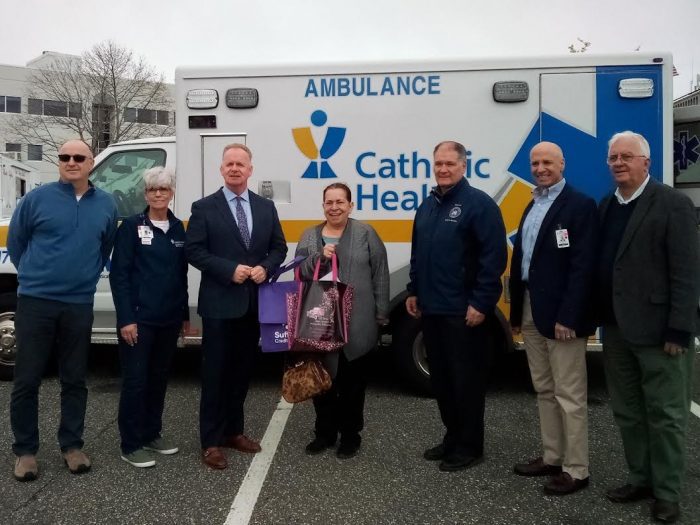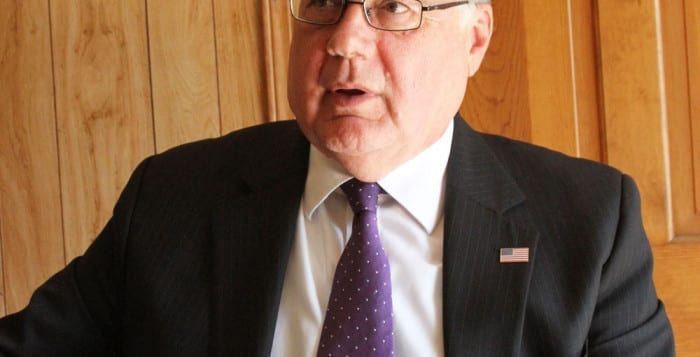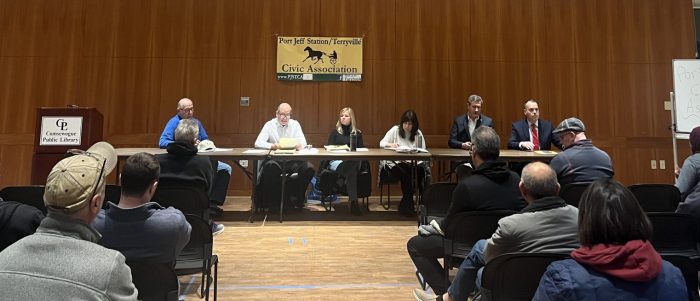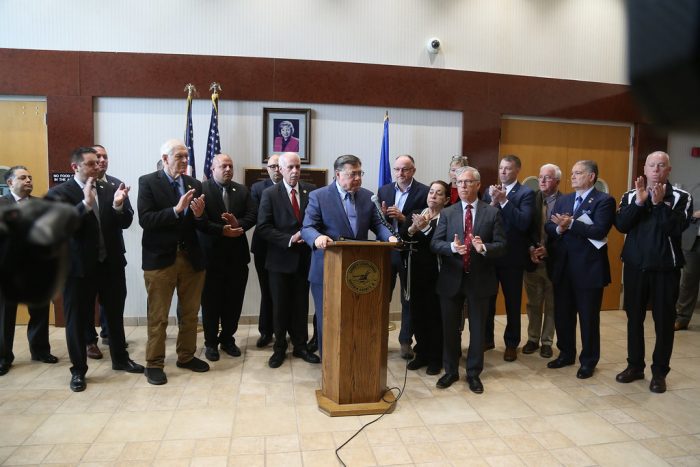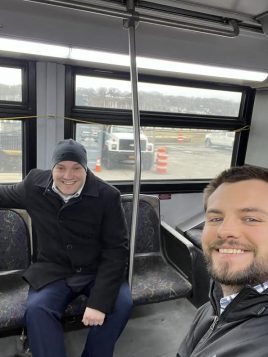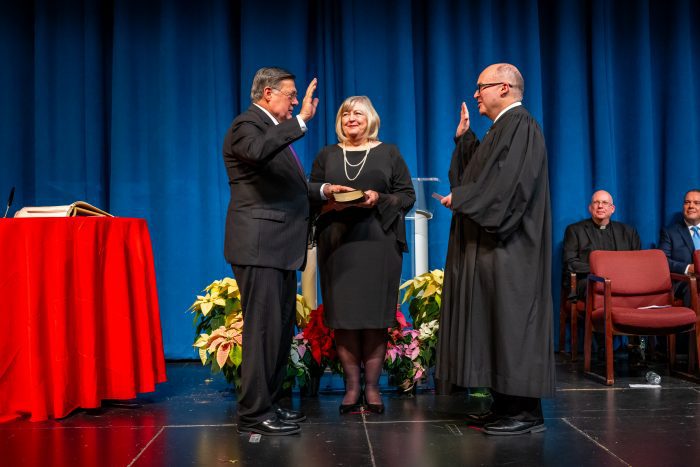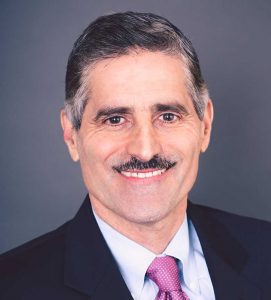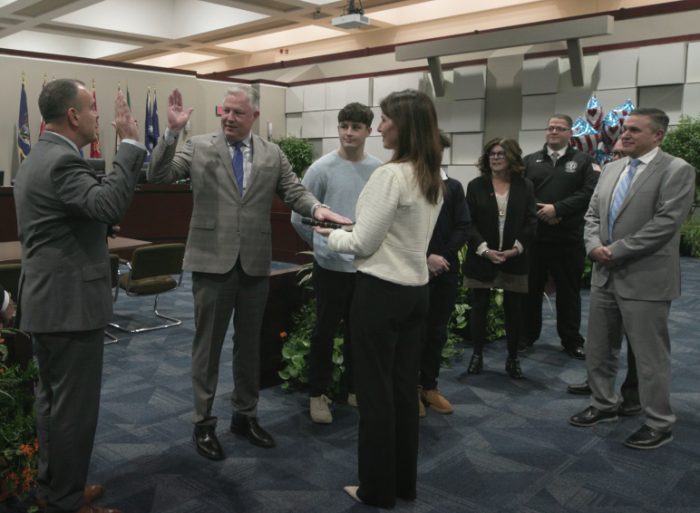By Samantha Rutt
At the March 26 Port Jefferson Station/Terryville Civic Association meeting, civic members elected a new civic board and engaged directly with elected officials from the Town of Brookhaven, namely Supervisor Dan Panico (R) and Councilmember Jonathan Kornreich (D-Stony Brook).
As a result of the election, Ira Costell and Carolyn Sagliocca will remain in their roles as president and vice president, respectively. Sheila Granito will serve as the temporary recording secretary, Lou Antoniello as treasurer and Jerry Maxim as corresponding secretary.
Following the election, the floor was opened up between the civic association and elected officials. Costell led the discussion dealing with issues the civic has addressed in recent meetings.
Community beautification projects and Sheep Pasture Road bridge
One of the key topics discussed was community beautification projects, with residents expressing interest in initiatives aimed at enhancing the aesthetic appeal of Port Jefferson Station and Terryville. From antique lighting additions to increased landscaping efforts and an addition of a community park, there was a seemingly shared enthusiasm for projects that would foster a sense of pride and belonging within the community.
Another key mention was that of the dilapidated Sheep Pasture Road bridge. Panico assured the civic that the highway superintendent would be tasked with the bridge construction.
“The highway superintendent is going to be working on that project almost exclusively in the design, and is supposed to be moving forward in design to take away some of the angles and make it easier for vehicles like buses and oil trucks to traverse the bridge in a manner without starting at the nearly 90 degree angles,” he said.
“That’s the information we have on that bridge … it is over 100 years old. Everyone knows it needs to be replaced, the weight limit was taken down from 5 tons to 3 tons. Hopefully soon you’ll invite the highway superintendent to come here so he can show you the design,” Panico assured.
Following mention of the decaying bridge, Costell brought up the proposed train car park as well as the Kunz property — two locations of community interest. About the Kunz property, formerly a greenhouse business, the supervisor assured the community that the town has an appraisal out for the property.
“Our town attorney has that property out for appraisal. We hope to get back an appraisal that is fair and we hope to acquire that property for the community,” Panico said.
In addition, to efforts to beautify the community, Sagliocca has contacted the town Highway Department regarding the posting of illegal signage and banners along the roadways with a goal to eliminate some of the roadside distraction the signs create.
“We’ve made a priority of getting out there because we’ve been aggressively cracking down on illegal housing and things of that nature to have those same individuals out serving tickets, and serving summonses,” Panico said on the issue.
“We just hired another individual who’s going to be helping along the same lines to clean up the signs along the roadway. All those signs of litter, whether they be feathered flags or Coroplast signs, we just unilaterally, we sweep them up, we take them and the ones that can be recycled, get recycled, the other ones just go in the trash,” Panico added.
Zoning and development
Proposed developments were also a focal point of discussion, with residents eager to learn more about upcoming projects and their potential impact on the local landscape.
Concerns were raised regarding issues such as traffic congestion, environmental sustainability and preserving the character of the neighborhood. Kornreich offered insights into the development process and assured residents that their input would be taken into consideration during decision-making.
“Nothing formal has happened yet. There was a public hearing that I and most of you were at, and I think that I’m representing the community correctly by saying we’re not opposed to the project, we think that the area is in need of some redevelopment, but the scale of it is more than what we want,” Kornreich said about the proposed Staller development.
Ultimately, those in attendance were looking for open communication between the developers and the community to best incorporate an accepted plan for the space going forward.
“I think one of the concerns we had in the public hearing was that a decision not be made before some site plan — that might be acceptable to the community — was an issue that we could talk about,” Costell said.
Panico explained further that the site plan still needs to be approved by the Planning Board, now the regular Town Board, which will allow for more direct representation from elected representatives and will create a space for the community to meet before the Town Board as well.
“This entire community will be back, either here or before the Town Board for ultimately the site plan. They [the developers] still have to go through the entire site buying process before the Town Board, which is different than an appointed Planning Board. So you have more direct representation from your elected representatives,” Panico explained.
The next civic meeting will be held on April 16.

